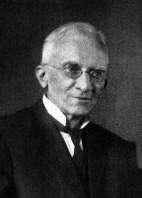Rev. Dr. Carl Manthey Zorn (1846-1928)
Carl Manthey-Zorn was born March 18, 1846, in Sterup, Germany, not far from the border of Denmark. His father, Hans Zorn, was a Lutheran pastor, and his mother, Lina Manthey, was from a Danish noble family. Carl received a good German education as a child while he lived in Hochspeyer and Odernheim, in western Germany.
At the age of 15 he attended the gymnasium in Kreuznach. A gymnasium was a classical school, preparatory to the universities. In 1862, after his father had passed away, he and his mother moved to Erlangen, where he continued his education. The Austro-Prussian War of 1866 brought Zorn to the University of Erlangen to continue his theological education. He decided to become a tutor for the children of a wealthy family in Schwerin, in northeastern Germany.
After some time, unsure of what to do next, he came into contact with a Pastor Platz in the town of Serrahn, who recommended that he go to the University of Leipzig and the mission society there. Platz discouraged him from becoming a parish pastor in his homeland because doctrinal discipline was weak in almost all of Germany. Zorn was of the same opinion and knew that it would be difficult for him to avoid interacting with the hypocritical pastors he disdained so much. It was during this time that he met his future wife, Marie Hengstenberg, whose uncle was Professor E. W. Hengstenberg of Berlin. He met her while visiting his mother on Christmas vacation in Erlangen. As Zorn instructed her in Luther’s Small Catechism through correspondence, she began to recognize the problems with her own Reformed faith (she was the daughter of a Reformed pastor) and wanted to become a Lutheran deaconess. Instead, Carl and Marie unintentionally fell in love and were engaged and later married.
In 1871, Zorn was ordained and sent to India to serve as a missionary. Their mission at that time was centered in the southeastern part of India, with about 20 missionaries at a dozen sites. Zorn was assigned to the district of Pudukottai, which had about 350,000 inhabitants. It was quite a challenge for Zorn to adjust to the tropical climate, the monsoons, and the dangerous wildlife, but Zorn grew to love India and its people. The Lord blessed his ministry there in a number of ways. He mastered the complex regional language of Tamil and delivered his first sermon in it after seven months. He was loved and respected by everyone in Pudukottai, and he even became acquainted with the local king.
However, Zorn’s stay in India would not last. Zorn and several of the missionaries had developed a close bond as they studied together God’s Word, Luther, and the Confessions. As they did so, they became ever aware of the unionistic tendencies among their fellow missionaries and the mission society. They earnestly sought to remain in India with the mission, but when the other missionaries and leaders in Leipzig refused to give up their unionism, they publicly declared their support of C. F. W. Walther and the position of the then orthodox Missouri Synod. They could not in good conscience remain in fellowship with the Mission Society and had no other choice but to leave.
In April of 1876 Zorn and three other missionaries returned to Germany. He knew for certain now that he should go to America and join the Missouri Synod. After reaching New York on July 4, he made his way to the Synod’s Northwestern District Convention in Minneapolis, where he personally met Walther. His next stop was Sheboygan, Wisconsin, where he would serve his first call as a parish pastor in the Missouri Synod. Zorn became most well-known for his literary activity. He wrote numerous articles for Missouri publications and over 60 books, mostly devotional works and commentaries.
In 1881, after five years in Sheboygan, Zorn accepted a call to Cleveland, Ohio, where he served until his retirement in 1911. His wife died in 1907, and after his retirement he lived with his son, Carl, in East Cleveland for the remainder of his life. On June 29, 1928 he suffered a stroke, and on July 12, at the age of 82, he entered into eternal glory. He had nine children, one of whom entered the ministry, and two of his grandsons went on to become missionaries in India like their grandfather.

Articles
Books
No books found for this person.
Book Reviews
No book reviews found for this person.
Images
No images found for this person.
Interviews
No interviews found for this person.
Presentations
No presentations found for this person.
Classes
No classes found for this person.
Promotions
No promotions found for this person.
Sermons
No sermons found for this person.
Websites
No websites found for this person.
